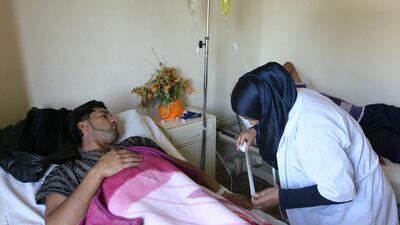BEIRUT // Syrian refugees in Lebanon lack access to specialised medical care such as dialysis and cancer treatment, forcing some to risk their lives to return to their war-ravaged country for health care, according to a report by Amnesty International released on Wednesday.
Amnesty said tens of thousands of Syrians are unable to get hospital treatment in Lebanon, leaving their chronic conditions and serious illnesses untreated. The crisis is due to a lack of funding for medical care for Syrians who fled to neighbouring Lebanon, where health care is privatised and expensive, Amnesty said. Some ill Syrians simply have been turned away.
The crisis adds another layer to the suffering of the 2.7 million Syrians who have fled the war. It also underscores how dramatically Syrian society has unravelled from the 3-year-old conflict.
More than 1 million Syrians have fled to Lebanon since the revolt against President Bashar Al Assad erupted in March 2011. Lebanon, a nation of 4.5 million people, has been struggling to cope with the massive influx, with many refugees in need of housing, education and medical care.
Malnutrition among children is one of the most dramatic problems, with aid workers saying starvation cases also are increasing in besieged areas of Syria. An estimated 10,000 Syrian children in Lebanon likely suffer from malnutrition, said Dima Ousta of the International Orthodox Christian Charities, a non-government organisation leading efforts in dealing with the issue in Lebanon.
Unicef says nearly 2,000 Syrian children in Lebanon are at risk of dying because of acute malnutrition if not immediately treated.
The UN’s refugee agency subsidises health care for Syrian refugees, but dwindling resources have forced the UNHCR to prioritise primary health care services and treatment of life-threatening illness.
Some privately funded hospitals offer health care to the Syrians and there are also several charity clinics, but it has not been enough.
“Hospital treatment and more specialised care for Syrian refugees in Lebanon are woefully insufficient,” said Audrey Gaughran, an Amnesty official. She said Syrian refugees in Lebanon are suffering as “a direct result of the international community’s shameful failure to fully fund the UN relief programme.”
The UN has appealed for $1.7 billion for Lebanon in 2014, and has received only a fraction of the funds needed to help the refugees.
Amnesty based its report on interviews with refugees, doctors and other health professionals.
One refugee, identified only as Amal, told Amnesty that she travels twice a week to Syria for dialysis, which she cannot afford in Lebanon. She travels by land and passes through areas where fighting between Mr Al Assad’s forces and rebels trying to overthrow him is still raging.
“I feel afraid to go to Syria, but I have no choice,” Amnesty quoted her as saying.
In Syria, Assad’s forces inched closer to seizing a central Aleppo prison, said state-run media and the Britain-based Syrian Observatory for Human Rights. Rebels have blockaded the central prison, with an estimated 4,000 inmates, for nearly a year. Rebels say government forces use the prison to launch strikes on rebel-held districts of the city, Syria’s largest.
The advance comes as Mr Al Assad’s forces appear intent on taking rebel-held parts of Syria’s major cities before the country’s June 3 presidential election. But Syrian rebels are pushing back. On Wednesday, rebels near the capital, Damascus, indiscriminately fired a series of mortar shells into the city, killing at least one man, state media reported.
A Damascus-based activist who uses the name Abu Akram Al Shami said rebels fired at least five mortar shells.
* Associated Press

